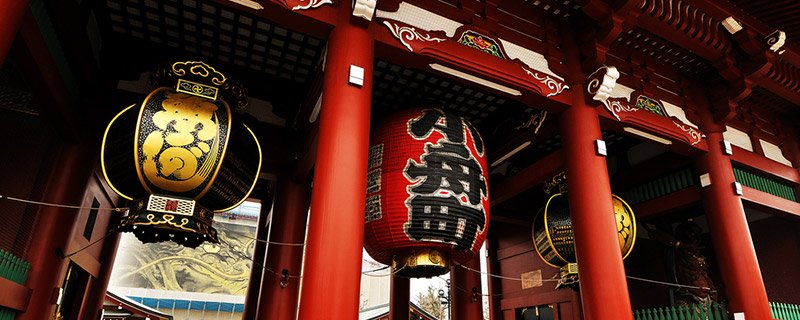Religion

Japan is home to many religions, with Shintoism and Buddhism being the two most widely practiced. Religion provides a code of conduct and morals that the people apply to their lives for social and cultural harmony.
Compared to Westerners, the Japanese do not really see religion as something that has to be preached or is to be considered as a doctrine. They do not say prayers at public events, such as government meetings or school ceremonies, and most of them do not even regularly go to shrines and temples for worship.
Most Japanese attend religious ceremonies, such as weddings, funerals, birth, New Year’s, and matsuri, but they look at religion as more of a personal matter that is not a common topic for day-to-day discussion.
Shinto
A religion that is as old as the Japanese culture, Shinto is the indigenous religion of the country and people of Japan. It was not founded by anyone, nor is it based on holy scriptures. It came about with the establishment of local traditions and customs from several centuries ago.
Shinto deities are known as “kami” and are essences or spirits that are believed to take the form of trees, rocks, wind, mountains, rain, fertility, and other concepts that play significant roles in our lives. When people die, they are said to transform into kami, and those that left important contributions to the society are enshrined. Shinto’s most important god is the Sun Goddess Amaterasu.
Approximately 80% of the Japanese population practice Shintoism, making it the country’s largest religion.
Top Shinto Shrines In Japan
- Ise Jingu – Located in Ise City, it is the most sacred Shinto shrine in Japan dedicated to Amaterasu Omikami, the Sun Goddess.
- Meiji JIngu – Located in the Harajuku district of Tokyo, it is dedicated to Emperor Meiji and Empress Shoken.
- Fushimi Inari-taisha – Found in Kyoto, it was built to honour the Shinto god of rice, Inari.
- Toshogu Shrine – This serves as the final resting place of shogun Tokugawa Ieyasu of the Tokugawa Shogunate, and is located in Nikko.
- Itsukushima Shrine – Famous for its large floating torii, this shrine was constructed in honour of the three daughters of the Shinto god of the sea and storms, Susano-o no Mikoto, who was also the brother of Shinto sun goddess Amaterasu.
Buddhism
Introduced to Japan between 538 and 552 by the Baekje from Korea, Buddhism is Japan’s second most practiced religion. It consists of several branches, including the Mahayana, which is the original one to arrive in the country.
When Buddhism found its way to Japan, Shinto was already widely practiced throughout the country. Despite that, it still got a warm reception from the ruling class and was declared the country’s new state religion.
In the beginning, the commoners had difficulty adjusting to Buddhism due to its unfamiliar and complex teachings. They also had minor issues with it as it clashed with their native religion Shinto. Fortunately, as time passed, both religions eventually found the common ground to thrive alongside each other.
Buddhist Schools In Japan
- Nara Schools – Introduced to Japan between the 7th and 8th centuries, the Nara Schools consist of six schools — Jojitsu, Hosso, Sanron, Kegon, Risshu, and Kusha-shu.
- Esoteric – Came about in the 9th century, the Esoteric Schools are made up of the Shingon Buddhism and the Tendai or Tiantai.
- Kamakura Buddhism – Started between the 12th and 17th centuries, it has three primary groups, the Amida or Pure Land Schools (which are composed of the Jodo-shu, Jodo Shinshu, Ji-shu, and Yuzu-Nembutsu Schools), the Zen Schools (which include the Rinzai, Soto, Obaku, and Fuke Schools), and the Nicheren Buddhism School.
Top Buddhist Temples In Japan
- Kiyomizu-dera – Located in Kyoto
- Todaiji Temple – Found in Nara
- Okunoin Temple – Located in Mount Koya
- Ginkakuji – Built along the Higashiyama mountains in Kyoto
- Kinkakuji – Found in northern Kyoto
- Yamadera Temple – Situated on the mountains of Yamagata City
- Hasedera Temple – Located in the mountainous eastern Asuka region
- Kokedera – A UNESCO World Heritage temple in Kyoto
Christianity
Comprising less than 1% of the Japanese population, Christianity is a minor religion in Japan. It consists of several denominations, including:
- Roman Catholicism – With approximately 510,000 followers, Catholicism in Japan consists of 16 dioceses that all operate under the Pope in Vatican City.
- Orthodox Christianity – Introduced to Japan in the 1800s, the Orthodox Church in the country has about 30,000 followers.
- Protestantism – Constituting only 0.4 % of the Japanese population (or about 510,000 people), Protestantism was brought to Japan in the 1800s by missionaries from the United States.
- The Church of Jesus Christ of Latter-day Saints (LDS) – Comprising of more than 120,000 members, the LDS Church was founded in Japan in 1901 by American missionaries.
Top Christian Churches In Japan
- Oura Church – Built in the mid-1800s, this is a Western-style Catholic Church in Nagasaki
- Holy Resurrection Cathedral – Located in Chiyoda in Tokyo, this is the main Orthodox Church in Japan
- Fukuoka Japan Temple – An LDS Church situated in Fukuoka and serves almost 8,000 members from the region
Other Minority Religions
Confucianism
Confucianism was brought to Japan by the Chinese during the Edo period. It teaches people to value morality, consideration, loyalty and humanity. Some Confucianism-related structures in Japan are the Nagasaki Confucius Shrine in Nagasaki and the Yushima Seido in Kanda, Tokyo.
Hinduism
There are very few Hindus in Japan, only around 4,000 of them, and the majority are found in Kobe and around the Kansai area. Despite being a minor religion in the country, Hinduism has influenced a number of Japan’s traditions and beliefs, particularly the Daisho-in Temple’s “Seven Gods of Fortune”, four of which are based on Hindu gods.
Jainism
Even though it shares many similarities to Buddhism, Jainism is not as widely practiced in Japan. It has three temples in the country, and its most important and famous temple is the Kobe Jain Temple in the city of Kobe.












